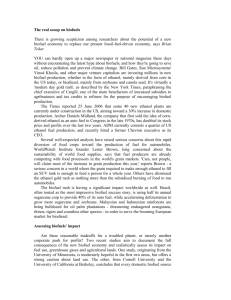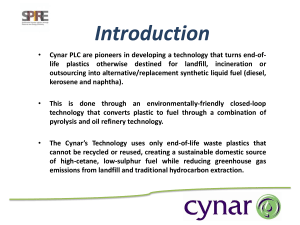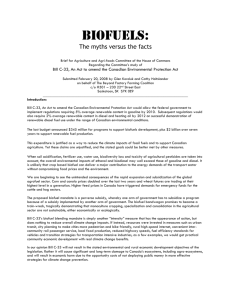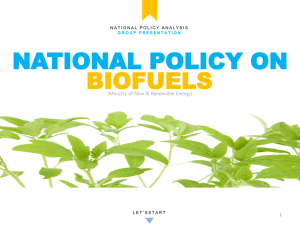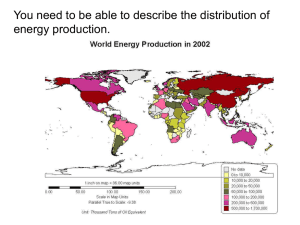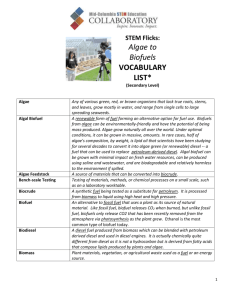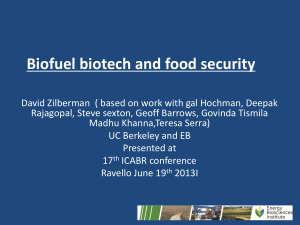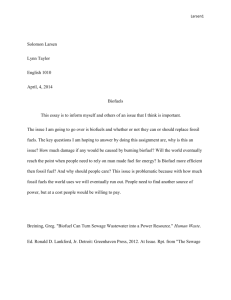File
advertisement
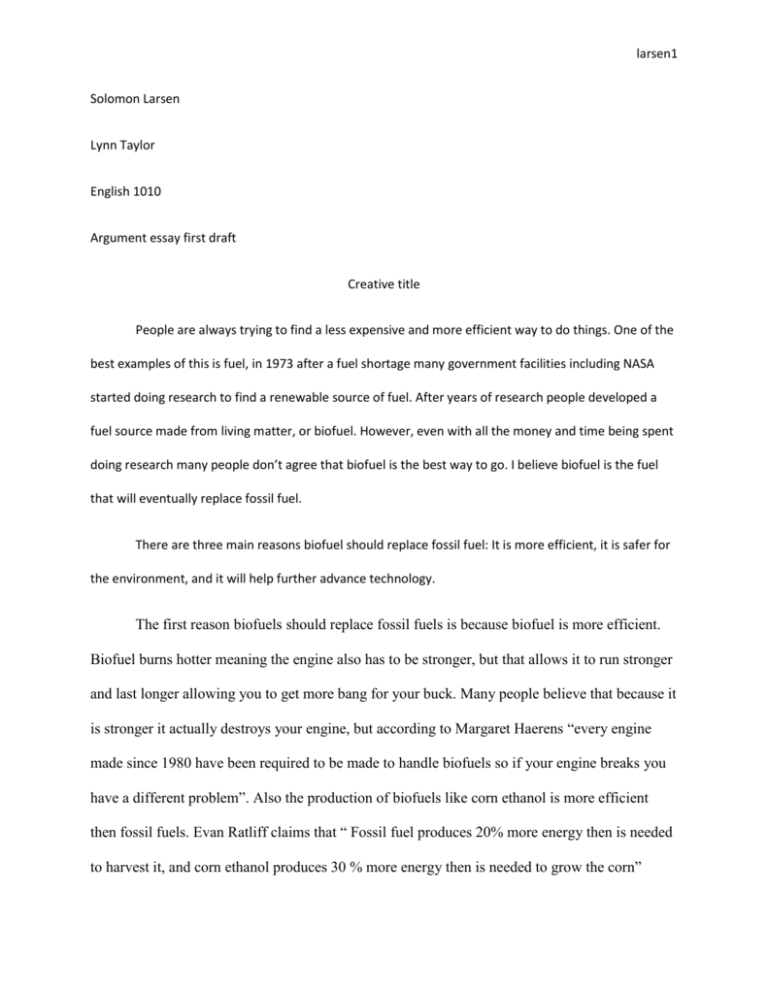
larsen1 Solomon Larsen Lynn Taylor English 1010 Argument essay first draft Creative title People are always trying to find a less expensive and more efficient way to do things. One of the best examples of this is fuel, in 1973 after a fuel shortage many government facilities including NASA started doing research to find a renewable source of fuel. After years of research people developed a fuel source made from living matter, or biofuel. However, even with all the money and time being spent doing research many people don’t agree that biofuel is the best way to go. I believe biofuel is the fuel that will eventually replace fossil fuel. There are three main reasons biofuel should replace fossil fuel: It is more efficient, it is safer for the environment, and it will help further advance technology. The first reason biofuels should replace fossil fuels is because biofuel is more efficient. Biofuel burns hotter meaning the engine also has to be stronger, but that allows it to run stronger and last longer allowing you to get more bang for your buck. Many people believe that because it is stronger it actually destroys your engine, but according to Margaret Haerens “every engine made since 1980 have been required to be made to handle biofuels so if your engine breaks you have a different problem”. Also the production of biofuels like corn ethanol is more efficient then fossil fuels. Evan Ratliff claims that “ Fossil fuel produces 20% more energy then is needed to harvest it, and corn ethanol produces 30 % more energy then is needed to grow the corn” larsen2 Another reason biofuel is better is because it is safer for the environment. Although it isn’t the cleanest solution like electric motors or solar power, it is the cleanest fuel. Many people argue that it is more toxic then fossil fuels because when biofuel is made from sewer sludge it is also being mixed in with any other chemical that gets watched down the drain like mercury or even some radioactive chemicals. This would be true but the sewer sludge goes through a sewer treatment system before it goes to the industries, and even after it goes to the biofuel factories they are required to do test on the sludge to make sure it doesn’t have any excess chemicals, and if it does they send it back to be sent through again. Ethanol and cellulose (corn and algae based biofuels) have “significantly less carbon dioxide and monoxide then other types of fuel meaning it causes less pollution, also contains 85% less cancer causing chemicals” The production of biofuel will even help clean polluted water. Biofuel made from sewer sludge actually cleans the sewer water to the point to where it is drinkable again. The technology used for this can also be used to clean up oil spills potentially saving millions of dollars and can even save wild life. Another type of biofuel that can help clean polluted water is cellulose which is made form algae. When people make cellulose biofuel they usually make it from the algae in swamp water which cleans the water and creates another potential source for fresh drinkable water. I believe that the production of biofuel is important because it will help further advance technology which is the third reason I believe biofuels will eventually replace fossil fuels. The main problem scientist have with producing biofuel is trying to find a way to harvest cellulose from algae efficiently. Producing cellulose requires a lot of research and its production will help the world advance further in many fields. One of the fields that will advance thanks to biofuel is chemistry. Chemistry is important for scientist because it helps produce almost everything we larsen3 need in our daily lives, and is used for medical purposes and military purposes. If scientist advance to the level when they can successfully extract fuel from algae efficiently the technology used will be able to help advance in other places we use chemistry. It will also help advance in technology, mainly in with motor vehicles and appliances such as lawnmowers or snow blowers. If we can run everything that uses gasoline with biofuels it will greatly decrease the amount of pollution in the air. The opinions against biofuels are mainly based on corn ethanol because it causes deforestation, shortage of food and food price increase, and why not? When it comes to food you can never have enough, so why would we use our food supply for fuel? According to Margaret Haerens article “Corn Ethanol Is Not a Disaster”( in 2007 studies showed that corn ethanol only raised families food bills by 0.2-0.3% "variations in the corn price 'explain' only 4% of the variations in the food CPI (Consumer Price Index)” In other words corn price would be considered a very small variable in deciding what drives the food CPI). Another type of fuel that is a common topic is biofuel made from human waste. Animal waste has been used for fuel for years so why is human waste any different? The answer is in the sewers, when waste is turned into fuel it goes through the sewer, into the sewer treatment systems and to the renewable energy facilities. But waste isn’t the only thing that goes down the “Everything gets dumped into the sewer at factories and at home everything that goes down the drain ends up in the sewer treatment system, the main problem is industrial chemicals, oils and solvents go down the drain. Even mercury and sometimes radioactive chemicals go down the drain and this is very toxic to the environment when it gets burned.”( Ronald D. Lankford) larsen4 Although there are dangerous chemicals getting mixed into the sewage, the sewage treatment system is able to remove all unwanted substances before sending it off to be made into fuel. So there are many issues with producing biofuels so why would we continue with this research? Because we will eventually run out of fossil fuels, and other types of energy like solar powered energy is too expensive for the average person to afford. Most people can’t even function properly if there phones died so imagine what would happen if no one was able to drive there vehicles or use there lawnmowers or other motored appliances. For the average person who can’t afford another source of power they will be forced to go back to the 18 century before motor vehicles were made. larsen5 Work cited "Using Human Waste for Energy Is Problematic." Human Waste. Ed. Ronald D. Lankford, Jr. Detroit: Greenhaven Press, 2012. At Issue. Opposing Viewpoints in Context. Web. 8 Apr. 2014. Leonard, Kirk. "Corn Ethanol Is Not a Disaster." Biofuels. Ed. Margaret Haerens. Detroit: Greenhaven Press, 2012. At Issue. Rpt. from "In Defense of Corn Ethanol." The Organic Center, 2009. Opposing Viewpoints in Context. Web. 8 Apr. 2014 Breining, Greg. "Biofuel Can Turn Sewage Wastewater into a Power Resource." Human Waste. Ed. Ronald D. Lankford, Jr. Detroit: Greenhaven Press, 2012. At Issue. Rpt. from "The Sewage Plant, the Promise of Biofuel." Environment 360. 2009. Opposing Viewpoints in Context. Web. 9 Apr. 2014. Ratliff, Evan. "Cellulosic Ethanol Shows Promise." Biofuels. Ed. Margaret Haerens. Detroit: Greenhaven Press, 2012. At Issue. Rpt. from "One Molecule Could Cure Our Addiction to Oil." Wired 15.10 (24 Sept. 2007). Opposing Viewpoints in Context. Web. 9 Apr. 2014.



